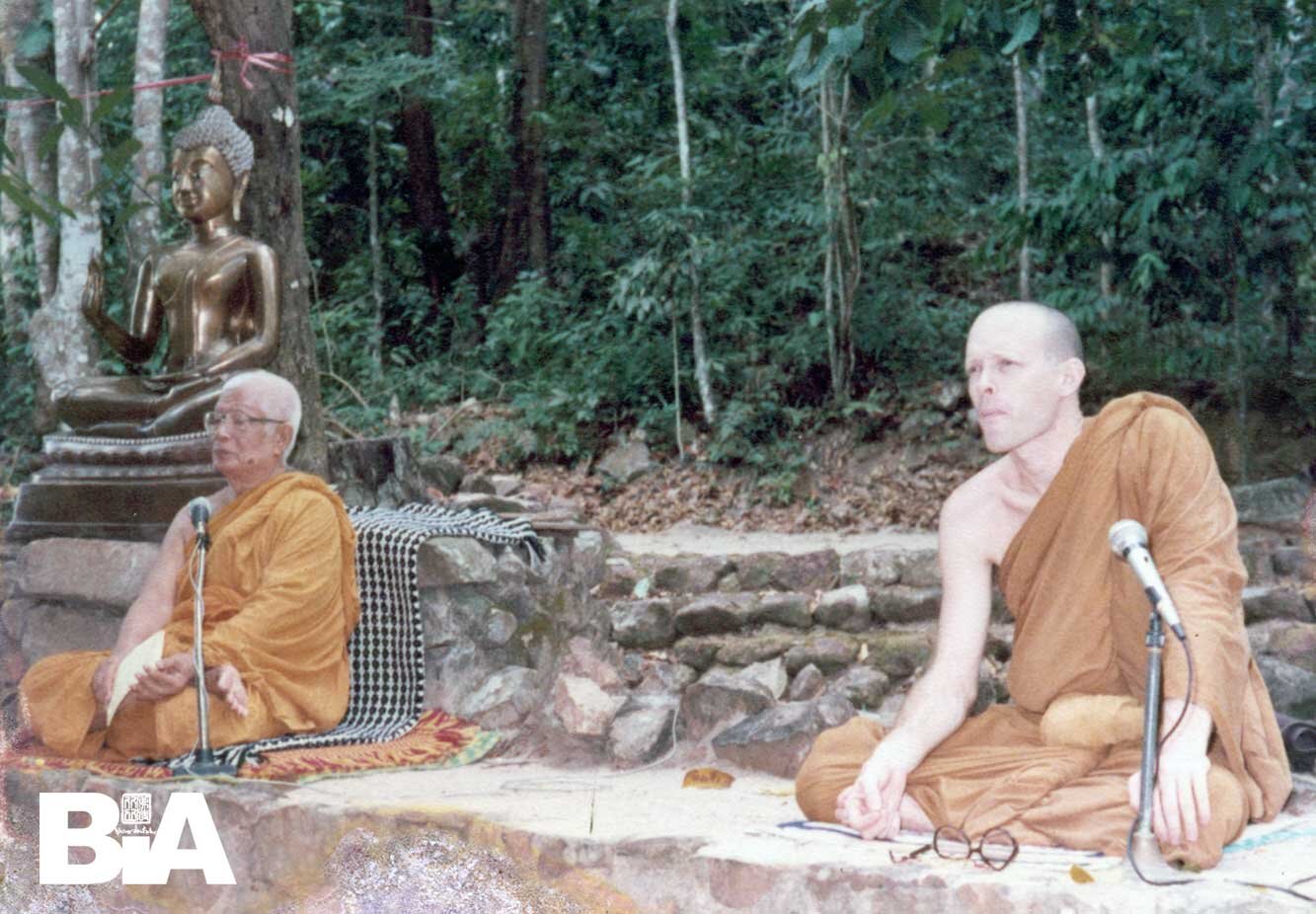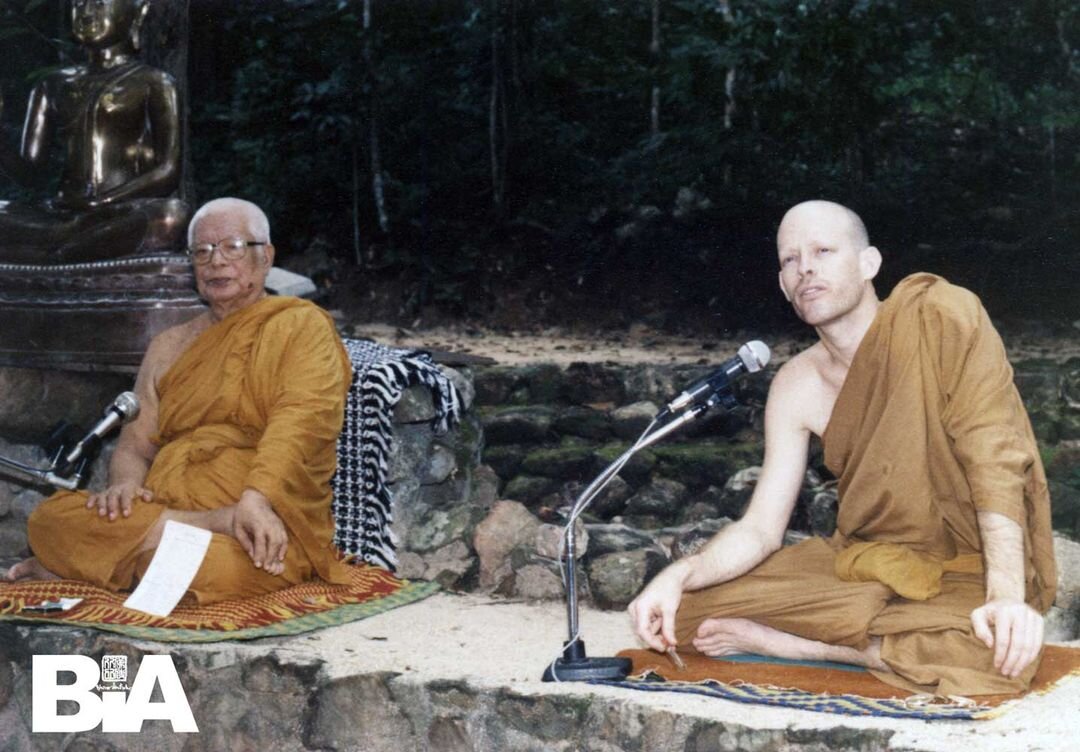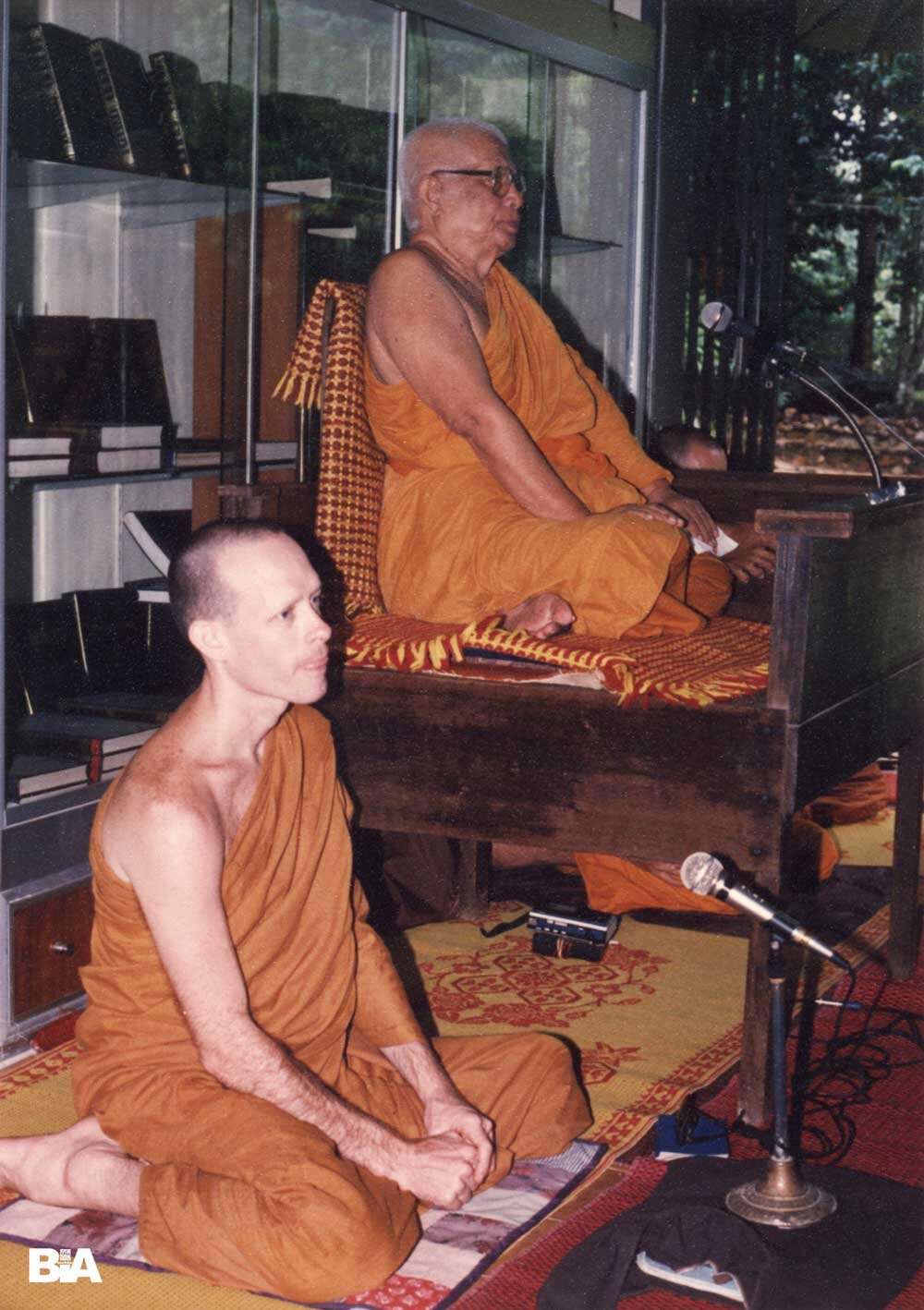

Dhamma Q&A with Buddhadāsa and monks from Wat Pah Nanachat
“What is the role of saññā (perception) in paṭiccasamuppāda?”

Dhamma Q&A with Buddhadāsa and monks from Wat Pah Nanachat
“In terms of the Four Foundations of Mindfulness, to what degree can they be practiced in ordinary life, and to what degree do they require formal meditation and a strong level of samādhi or concentration?”

Dhamma Q&A with Buddhadāsa and monks from Wat Pah Nanachat
“Does mathematics exist in reality, in nature, or only in the mind?”

Dhamma Q&A with Buddhadāsa and monks from Wat Pah Nanachat
“In terms of the wheel, of paṭiccasamuppāda (dependent origination), where does it break in terms of the Four Foundations of Mindfulness?”

Dhamma Q&A with Buddhadāsa and monks from Wat Pah Nanachat
“Some people explain that the kind of tendencies for when we build up defilement or defiled tendencies, that somehow this is connected with the body. Maybe we kind of store them in different parts of the body, or that there is some connection. And then at times these arise as vedanā, as feelings, and then if one is mindful of them, you can kind of come to terms with the vedanā and the supposed underlying defiled causes. But if you don’t, aren’t mindful of it, then you just get caught up in the thing over and over again. Is this Buddha’s thinking or not?”

Dhamma Q&A with Students from Puget Sound University
“I’m a little more confused now when you talk about getting rid of the self. The way I saw it before is, though you rid yourself of the self, you are still a part of this world, and things in the world still affect you. As such, it seems that things like war or the destruction of the environment will still affect the aggregates that compose an individual. Though you do not have a self, the first duty to survive is threatened, and these problems must be addressed.”

Dhamma Q&A with Students from Puget Sound University
“Sometimes when I think about all the big problems in the world, it seems like we’re kind of heading toward Armageddon – extinction of mankind. Is this just paranoia or are we really in trouble this time? And how does Armageddon fit into the whole Buddhist view?”

Dhamma Q&A with Students from Puget Sound University
“My question has to do with kamma and duty. It seems to me that there are two different duties, a higher one and a lower one: one to the self or to the ridding of the self, and one for the community, to society. I was wondering which duty comes first. An example that I thought of was an animal that was struck by a car that was still alive but in deep suffering and he would die in time. You had a duty to the animal in the sense of society to end his pain, but you also have the duty to the self of not killing the animal to end the pain.”

Dhamma Q&A with Students from Puget Sound University
“We have read “Dhammic Socialism,” and in “Dhammic Socialism” a caste system based on function and responsibility is discussed. We have also learned that the Buddha rejected the caste system in India. So I was wondering if Ajahn Buddhadasa could please explain what he means by caste and how it is to function in dhammic socialism?”

Dhamma Q&A with Students from Puget Sound University
“How does compassion arise if you’ve detached yourself so much that you are not affected by the people suffering? How far does the detachment go?”

Dhamma Q&A with Students from Puget Sound University
“Ajahn Buddhadasa has written that with the proper understanding of Dhamma language it’s possible to recognize the common message of all religions. How is it possible to convey this commonality using everyday language to religious zealots who do not seem to comprehend the Dhamma language of their own tradition?”

Dhamma Q&A with Students from Puget Sound University
“If everything goes according to Dhamma and the natural law, including the mind which is naturally free of impurities, then how is it that the idea of self, which arises instinctually, is unnatural and impure and needs to be gotten rid of?”

Dhamma Q&A with Students from Puget Sound University
“There seems often to be a conflict between the beliefs of popular Buddhism and what the Buddha actually taught. Are these popular forms of belief a form of upaya (skillful means), or how are they justified in light of what the Buddha actually taught?”

Dhamma Q&A with Students from Puget Sound University
“Can Ajahn Buddhadasa explain his concept of insight worker or laborer, vipassana samrap kammakon, and where in the scriptures he finds justification for that?”

Dhamma Q&A with Students from Puget Sound University
“As of this moment there more than likely is fighting going on in the Persian Gulf. Had you had the opportunity to offer advice to prevent this atrocity, what would you have said? Or is there ever a chance for leaders who are so deluded by power to awaken and see what is really going on in order to avert an action such as war?”

Why the Monkeys Washed out Their Ears
“Why do people who understand dukkha or dukkhatā and attā and dependent origination, and know they should apply themselves to the Four Noble Truths and to the Eightfold or Tenfold Path, and yet they don’t? In other words, how does one explain the human tendency of irrationality in terms of dukkha and dependent origination?”

Why the Monkeys Washed out Their Ears
“Does ānāpānasati explore the subconscious mind in any way?”

Why the Monkeys Washed out Their Ears
“Can you explain your own experience of ‘not-me’? Or is it an inference you have deduced from your experience of ‘not mine’?”

Why the Monkeys Washed out Their Ears
My question is although I understand ‘not mine,’ I am confused by ‘not-self.’ So far in this course, the distinction between ‘not me’ and ‘not mine’ has not really been made – they’re generally mentioned at the same time. Is it usual to experience one without the other?”

Why the Monkeys Washed out Their Ears
Enlightened people are said to keep staying alive because of their commitment to help others to overcome suffering. Would this be an example of selfless attachment? What keeps the commitment from fading away?
